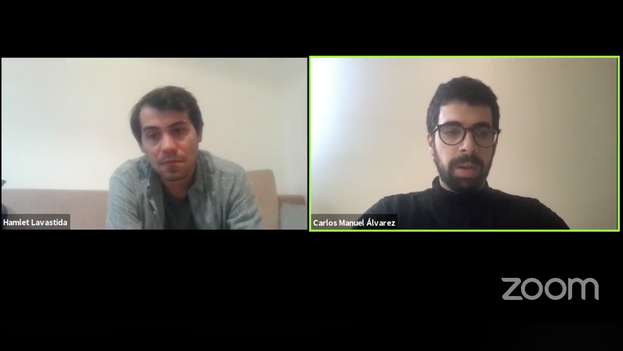
![]() 14ymedio, Luz Escobar, Havana, 29 September 2021 — This Tuesday, Hamlet Lavastida denounced that during his time in prison in Cuba he was pressured to sign documents which portrayed him as a collaborator of State Security. In an interview with writer and journalist Carlos Manuel Álvarez, conducted from Warsaw, where he flew on Saturday after being released from prison, the artist spoke about the psychological violence to which he was subjected during the three months he was in Villa Marista prison, headquarters of the political police in Havana.
14ymedio, Luz Escobar, Havana, 29 September 2021 — This Tuesday, Hamlet Lavastida denounced that during his time in prison in Cuba he was pressured to sign documents which portrayed him as a collaborator of State Security. In an interview with writer and journalist Carlos Manuel Álvarez, conducted from Warsaw, where he flew on Saturday after being released from prison, the artist spoke about the psychological violence to which he was subjected during the three months he was in Villa Marista prison, headquarters of the political police in Havana.
Lavastida explained that the agents always create characters and set up “a theater” to interact with the detainees, and for this reason he also began “to put on a series of dramatizations.”
“I began to make the famous act of repentance and retractions, to write that I never wanted to participate in political life, in any activism group,” he said, and recounted that he was presented with a paper which stated that he collaborated with them. “I remember that officer Darío suggested it to me and basically dictated what I had to say,” Lavastida declared during the interview, which was broadcast live on the Facebook page of the magazine directed by Álvarez, El Estornudo.
The artist decided to go ahead and tell all before State Security uses those signed documents against him. “It doesn’t really affect me much, because my real commitment is to creation, you can use that against a person who wants to have a political career,” opined Lavastida, who stressed that in his life “he had never had anything to do with the Police or with Security” and that everything he experienced was “new” to him.
Writing those “texts of self-repentance,” he found, was the “slightly more noble” way to get out of jail
Writing those “texts of self-repentance”, he found, was the “slightly more noble” way to get out of jail. “Doing it by denouncing others seemed less honorable to me and self-incrimination, of course, was not going to help me.”
His prison cell in Villa Marista was an “excessively small” place that he shared with four people, he said. “I was trying to walk those six steps, trying to do something with my hands, from the nervousness of not knowing what was going to happen with my case.” The food, he points out, “was not bad but was very scarce”, to the point that some prisoners “counted the spoonfuls” every day.
Regarding the interrogation sessions he experienced in those days, he recalled that they asked him all the time to help the agents “clarify the situation” and that they insisted on the story that he was “sent by the State Department.” The phrases most often repeated to intimidate him were along the lines of: “your mother is going to suffer a lot” or “you get 15 to 20 years for incitement of a crime.”
That was the offense of which he was accused, as reported by State Security to his family after he was transferred to Villa Marista. Lavastida had returned to Cuba from Germany on June 21, after completing his residency at the Künstlerhaus Bethanien gallery in Berlin. Five days later, after fulfilling the regulatory period of isolation (for potential Covid exposure) in a center arranged by the Government in the Flores neighborhood of the capital, he was arrested.
The accusation was based on a conversation in a private group chat of 27N (27 November) on Telegram, which was filtered and analyzed at the moment by official presenter Humberto López on state television.
The artist is currently in Poland with his girlfriend, the Cuban poet Katherine Bisquet, with whom Carlos Manuel Álvarez announced he will interview this Wednesday.
During the conversation, Lavastida alluded several times to the number assigned to him in prison: 2,239. His life will be marked by it for a long time, said the artist.
Translated by Silvia Suárez
____________
COLLABORATE WITH OUR WORK: The 14ymedio team is committed to practicing serious journalism that reflects Cuba’s reality in all its depth. Thank you for joining us on this long journey. We invite you to continue supporting us by becoming a member of 14ymedio now. Together we can continue transforming journalism in Cuba.
